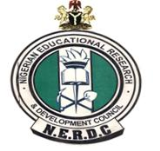Press Release
The One day stakeholders meeting on the official dissemination of the National Reading Framework (NRF) and It's Implementation Guidelines
Executive Secretary, Prof. Salisu Shehu meets stakeholders on official dissemination of of the National Reading Framework and it's Implemention Guidelines.
The One day stakeholders meeting on the official dissemination of the National Reading Framework (NRF) and It's Implementation Guidelines was aimed at creating awareness to the grassroots on the importance of National Reading Framework 's goals and objectives.
The framework sets standard specifications and guidelines for reading instructions and learning pertaining to reading skills, reading performance/proficiency criteria, graded reading texts, teacher training capacity, etc.
The implementation of the National Reading Framework as a literacy transformative tool will amongst other benefits, provide a common guideline and framework for discussing reading instructions, which can help to reduce confusion and inconsistencies; provide a specific guide on measuring learners reading capabilities to ascertain the needed help to they require for higher education; and empower educators and policy makers to make informed decisions about age specific reading instructions and develop targeted interventions that will address the unique needs of our learners to acquire critical reading skills.
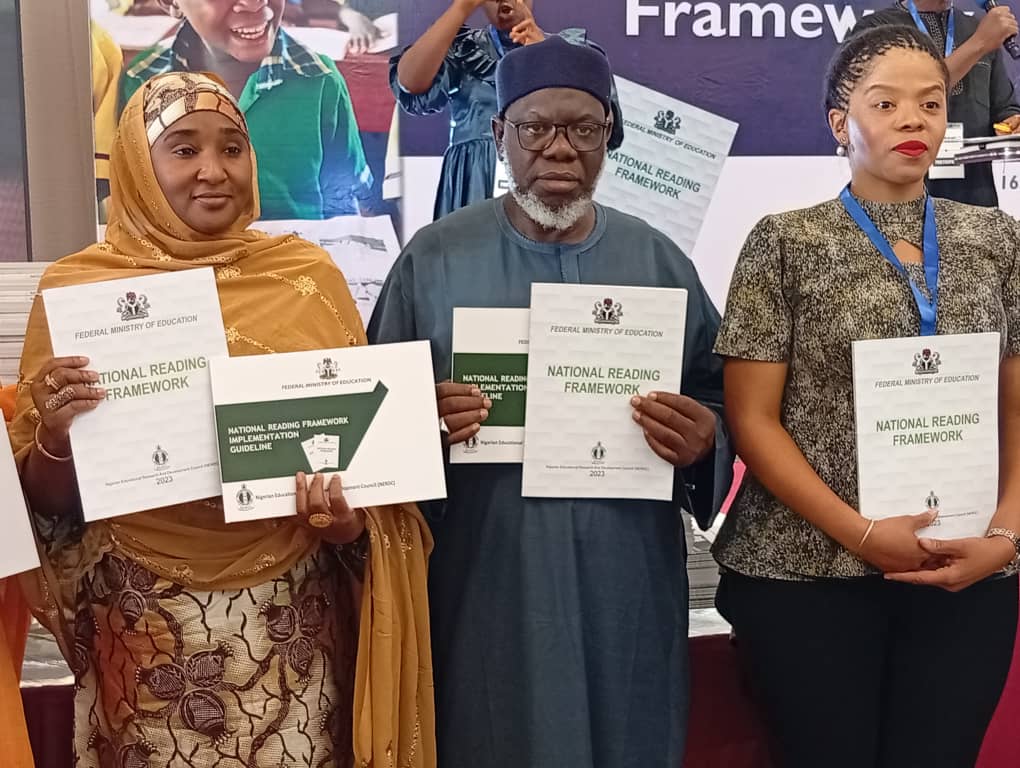
(l-r) The Hon. Minister of State for Education - Prof. Suwaiba Said Ahmad; the Executive Secretary, NERDC - Professor Salisu Shehu and; the Director, Education Office, USAID - Dr. Elice Elegbe presenting the National Reading Framework and it's Implementation Guidelines at the official dissemination of the National Reading Framework and it's implementation guidelines on 16/01/2025.
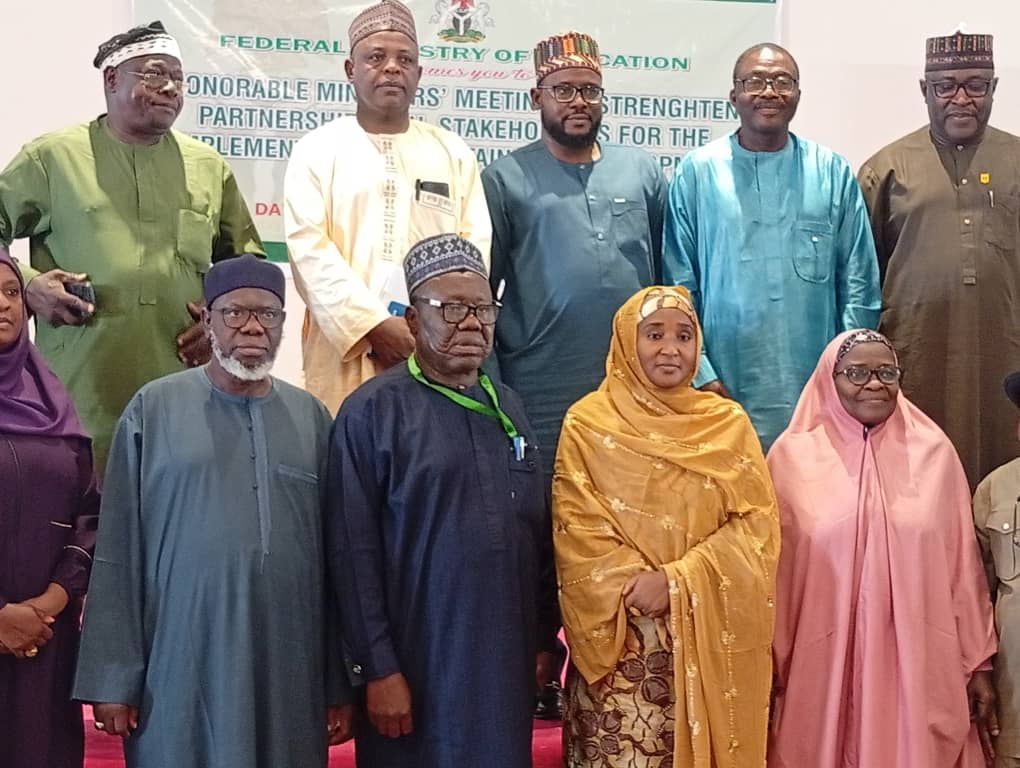
Front row, (l-r) The Chairperson, Commissioner of Education - Hajiya Sadiat Modibo Kawu; the Executive Secretary, NERDC - Professor Salisu Shehu; the Director, Polytechnics Education and Allied Institutions, FME - Dr Ejeh A. Usman; the Hon. Minister of State for Education - Prof. Suwaiba Said Ahmad; and; the Director General, National Teachers Institute (NTI) - Professor SaÁdiyya Sani Daura during the official dissemination of the National Reading Framework and it's implementation guidelines on 16/01/2025.
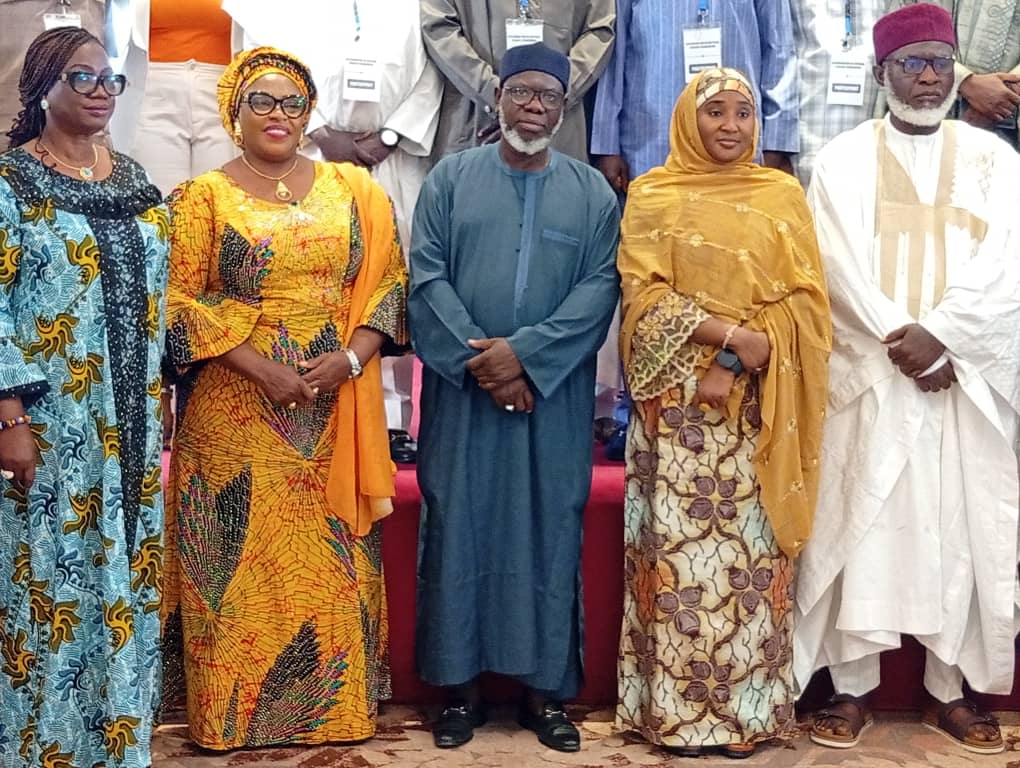
Front row, (l-r) The Director Basic Education, FME - Dr. (Mrs) Olatunji-David Olubanke; Director Education Planning, Research & Development, FME - Mrs. Obianuju Anigbogu; the Executive Secretary, NERDC - Professor Salisu Shehu; the Hon. Minister of State for Education - Prof. Suwaiba Said Ahmad; and, Prof. Iliyasu Usman - Federal University of Lafiya and representative of the Sultan of Sokoto during the official dissemination of the National Reading Framework and it's implementation guidelines on 16/01/2025.
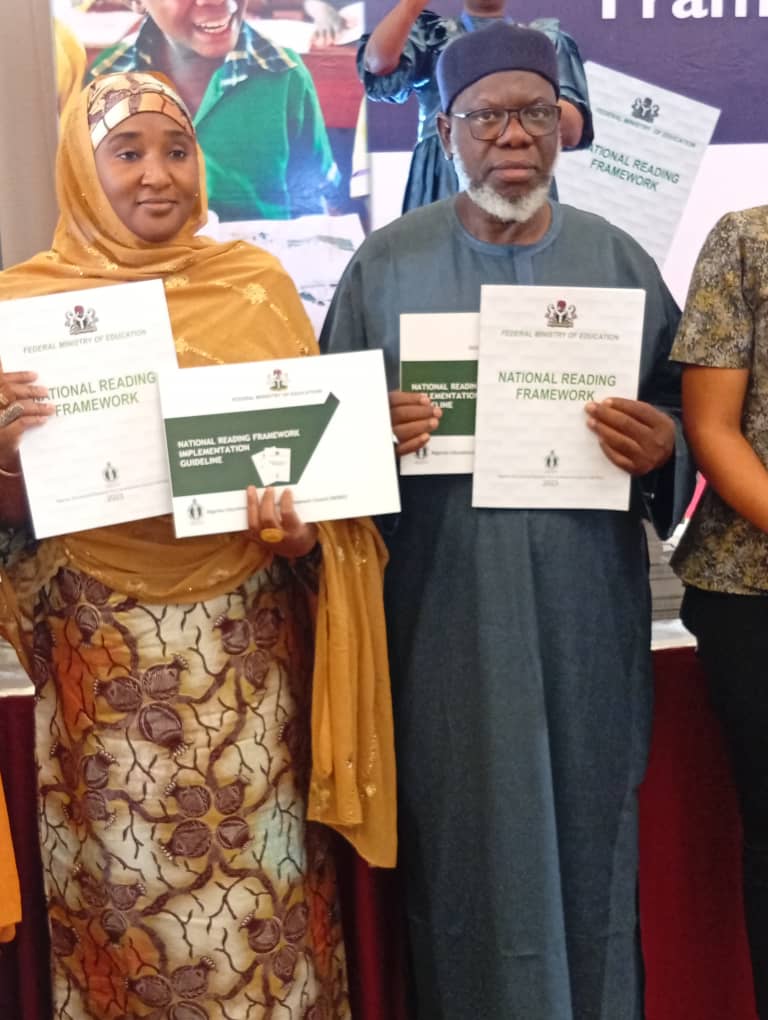
(l-r) The Hon. Minister of State for Education - Prof. Suwaiba Said Ahmad; the Executive Secretary, NERDC - Professor Salisu Shehu and; the Director, Education Office, USAID - Dr. Elice Elegbe presenting the National Reading Framework and it's Implementation Guidelines at the official dissemination of the National Reading Framework and it's implementation guidelines on 16/01/2025.
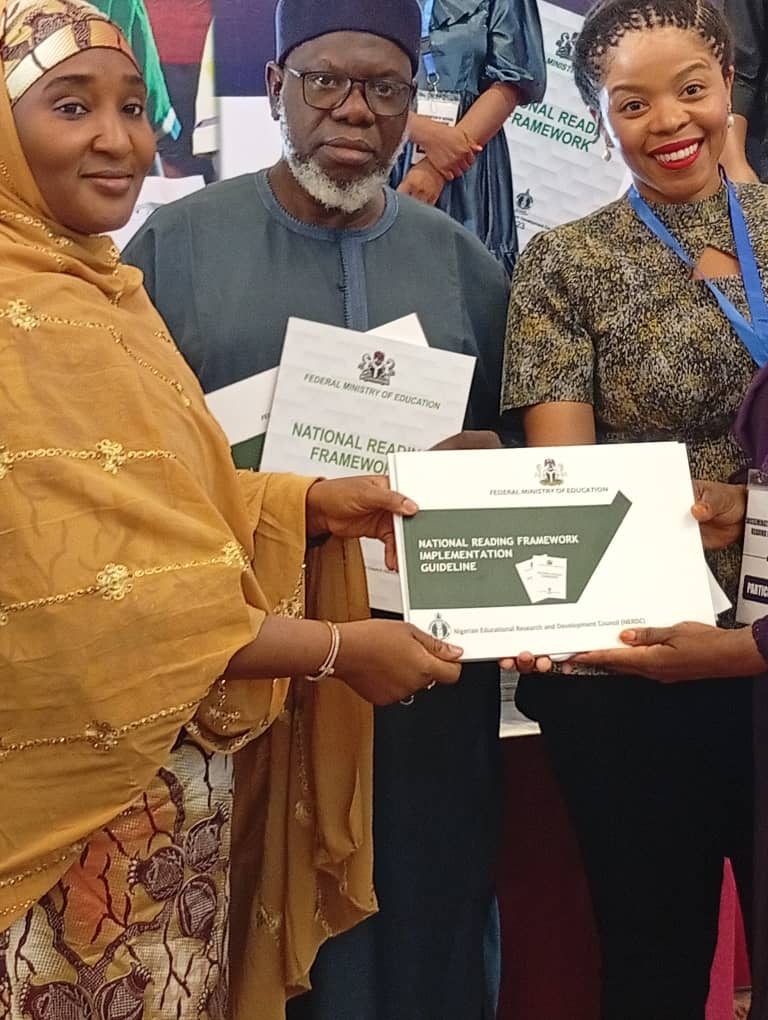
(l-r) The Hon. Minister of State for Education - Prof. Suwaiba Said Ahmad; the Executive Secretary, NERDC - Professor Salisu Shehu and; the Director, Education Office, USAID - Dr. Elice Elegbe presenting the National Reading Framework and it's Implementation Guidelines at the official dissemination of the National Reading Framework and it's implementation guidelines on 16/01/2025.
NERDC, PPDC Commence Adoption Of Online Safety Courses Into Nigerian School Curriculum
5th December 2018
The Nigerian Educational Research and Development Council (NERDC) and the Public and Private Development Centre (PPDC) with support from Google, today, began a two-day workshop for the adoption of online safety courses in the Nigerian school curriculum.
The workshop is taking place at Freshland Hotel Mararaba Old Karu, Abuja.
NERDC is the Ministry of Education's council responsible for curriculum development.
PPDC is a citizens sector organization that seeks to promote increased citizens participation in governance, and its Digital Inclusion and Safer Internet (DISI) program promotes universal access to ICTs in a way that preserves the safety and freedom of the internet.
According to the statement, the aim for the online safety curriculum adoption is to teach the Nigerian child the fundamentals of digital safety so they can be safe, confident explorers of the online world.
"The purpose of this workshop was to draft a Stand-Alone Online Safety Module for the Nigerian School Curriculum," the statement read in part.
The Executive Secretary, NERDC, Professor Ismail Junaidu, described this development as imperative to enabling the youth thrive in the digital era.
He said, "I am glad that we are collaborating with Google and PPDC in ensuring that every Nigerian child gains knowledge on how to be responsible and safe in the online world."
The CEO of PPDC, Nkemdilim Ilo described as timely, the move to adopt online safety into the Nigerian curriculum.
"The adoption of online safety in the Nigerian curriculum would enable our children to be responsible digital citizens who use the internet for socio-economic good," she said.
"The adoption of online safety in the Nigerian curriculum would enable our children to be responsible digital citizens who use the internet for socio-economic good," she said.
The statement further disclosed that from the first quarter of 2018, NERDC, PPDC and Google have been developing a framework towards the adoption of online safety courses in Nigerian school curriculum.
PPDC and NERDC signed a Memorandum of Understanding to formalize this partnership last week.
"During the workshop NERDC, PPDC and other IT specialist in attendance worked together to define the scope of the curriculum; Identify Resource persons and Identify carrier subjects such as Computer studies, English Language, Civic Education, Commerce and Economics that online safety can be infused into," the statement further read.
NERDC promised to support Kogi Government on teachers' training, production of curriculum and indigenous languages.
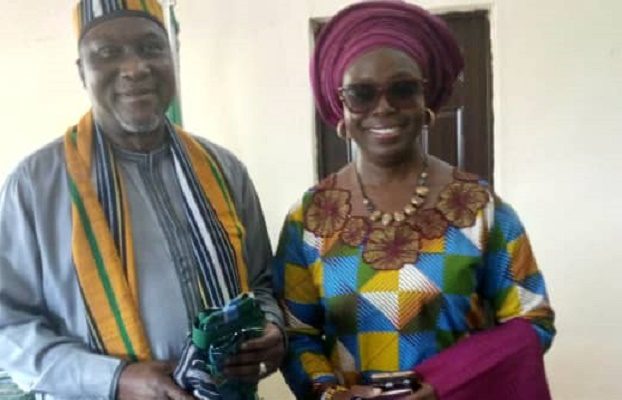
Executive Secretary Nigerian Educational Research and Development Council, NERDC Prof. Ismail Junaidu
and Commissioner for Education Kogi State, Mrs Rosemary Osikoya, in Abuja. 24th November 2018
The Nigerian Educational Research and Development Council (NERDC), has promised to support Kogi Government on teachers' training, production of curriculum and indigenous languages.
Prof. Ismail Junaid, the Executive Secretary of NERDC, made the promise in Abuja after stakeholders meeting with Kogi Ministry of Education, Science & Technology.
Junaid said that NERDC would partner with the ministry on how to make curriculum available in all schools in, saying that without curriculum, no meaningful learning would take place.
He said that the council had also promised to give technical expertise to train Kogi teachers to have capacity building, both in curriculum content implementation and education in general.
"We have promised the commissioner that we are ready to give all the necessary assistance as far as our mandate is concern to move education forward in Kogi".
"We will collaborate with Ministry of Education in producing copies of the curriculum and making them available to schools.
"We will also ensure teachers' capacity building by giving the technical assistance in training the teachers on how to implement the content of the curriculum," Junaid said.
He said that the management of the council had also discussed issue of language; the need to give technical expertise to help the state its indigenous languages like Igala, Ebira, Bassa, Nupe among others.
"I am very happy for this partnership, because Kogi Commissioner is the first to come since I resumed office as the executive secretary of this institution in 2015."
He commended Gov. Yahaya Bello for the decision to re-classify and upgrade some of state schools into science & technical colleges and promised technical expertise as well as entrepreneurship support.
In her remarks, the Commissioner for Education, Mrs Rosemary Osikoya, thanked the NERDC for partnering with the state government.
She said: "The partnership is still delivering on what Gov Bello has promised on quality education".
"We do not have enough curriculum in our schools and if we have to buy them, it is better to partner with NERDC so that we can have access to curriculum and training.
"We have met with NERDC to ask what the curriculum said we should do." This also conforms with what the governor has promised in the 2018 budget, to provide learning and teaching aids, to address the fundamental instructions.
She said that the ministry would be engaging with the traditional rulers and Federal Colleges of Education in Kogi, Ankpa and Okene, to see what the ministry could do.
"By so doing, Igala and Ebira will become languages of instructions that we no longer have to struggle with language disparity, especially at the basic level.
"I am happy we have been able to deliver on access to curriculum, training of teachers and language of instruction for Kogi and other areas of support at cost effective rate."
(NAN)
Development Of Capital Market Studies Curriculum To Boost Investor Education- SEC
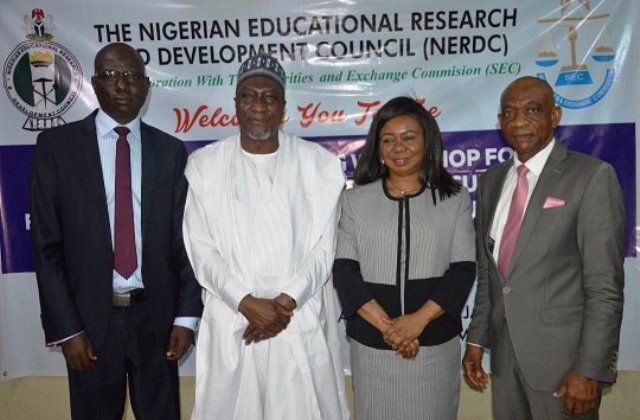 From Left; Acting Executive Commissioner Operations Securities and Exchange Commission, SEC, Mr. Isyaku Tilde, Executive Secretary Nigerian Educational Research and Development Council, NERDC Prof. Ismail Junaidu, Acting Director General SEC, Ms Mary Uduk and Acting Executive Commissioner Corporate Services SEC, Mr. Henry Rowlands at the Planning and writing workshop for the development of Capital Market Studies Curriculum (CMSC) for Basic and Senior Secondary Schools levels held in Lagos on Monday 12th November 2018
The Securities and Exchange Commission (SEC) has restated its commitment to further educate and enlighten investors in the Nigerian capital market to enhance their ability to make informed investment decisions.
The Acting Director General of the Securities and Exchange Commission (SEC) Ms. Mary Uduk who stated this at the Planning and writing workshop for the development of Capital Market Studies Curriculum (CMSC) for Basic and Senior Secondary Schools levels held in Lagos, Monday, said the development of the curriculum is one of such avenues.
Uduk said that the Commission has been in the vanguard of inculcating financial literacy for quite a long time because the SEC has realised that it is very important for students to imbibe the culture and habit of being financial literate and to be familiar with the operations of the capital market.
According to her, "This partnership with the Nigerian Educational Research and Development Council (NERDC), to actualize this ground breaking Capital Market literacy programme, is part of the Securities and Exchange Commission's effort at vigorously pursuing the implementation of one of the essential initiatives of the 10-year Nigerian Capital Market Master Plan".
Uduk said the implementation programme kick-started with the signing of a Memorandum of Understanding between the Commission and the NERDC in 2016, to develop a Standalone Capital Market Studies (CMS) curriculum for infusion into Basic and Senior Secondary Schools.
"I am happy to announce that, after a successful workshop for contents selection, the stage is now
set for the planning and writing of the standalone curriculum" The Commission recognizes the efforts required for other stages of the programme and remain confident that with the active support and commitment of our stakeholders we will complete this project" she stated.
She said the Commission recognizes the efforts required for other stages of the programme and remain confident that with the active support and commitment of all stakeholders the project will be completed.
In his welcome address, Executive Secretary National Educational Research and Development Council (NERDC) Prof Ismail Junaidu said the capital market connects the financial sector with the real sector of the economy and in the process, facilitates real sector growth and economic development adding that it increases the proportion of long term savings that are channeled to long term individuals/households and channels them into long term investments and fulfils the transfer of current purchasing power from surplus sectors of the economy to deficit sections.
He said a nation's economic growth is expected to promote an efficient and effective financial sector that pools domestic savings and mobilises capital for productive purposes. Hence he said, an economy that is not growing can hinder stock market development, and engender such problems as low capitalisation, which limits the savings function of the stock market; and illiquidity of the market which is a disincentive to investment.
Junaidu described capital market education as a strategic imperative which requires a comprehensive curriculum run by competent academic and professional personnel adding that early involvement of the youth in Capital Market Studies could derive profit, growth and perhaps be the much sought antidote to over dependence on paid employments was one of the reasons the SEC approached NERDC to mainstream capital market issues into the national curriculum.
He therefore expressed gratitude to the SEC Management on their commitment to the execution of the project.
The 10 year Capital Market Master Plan requires the SEC to inculcate the culture of financial literacy and specifically to introduce Capital Market Studies (CMS) into curriculum at all levels of education and to encourage CMS as a degree programme in the tertiary institutions.
From Left; Acting Executive Commissioner Operations Securities and Exchange Commission, SEC, Mr. Isyaku Tilde, Executive Secretary Nigerian Educational Research and Development Council, NERDC Prof. Ismail Junaidu, Acting Director General SEC, Ms Mary Uduk and Acting Executive Commissioner Corporate Services SEC, Mr. Henry Rowlands at the Planning and writing workshop for the development of Capital Market Studies Curriculum (CMSC) for Basic and Senior Secondary Schools levels held in Lagos on Monday 12th November 2018
The Securities and Exchange Commission (SEC) has restated its commitment to further educate and enlighten investors in the Nigerian capital market to enhance their ability to make informed investment decisions.
The Acting Director General of the Securities and Exchange Commission (SEC) Ms. Mary Uduk who stated this at the Planning and writing workshop for the development of Capital Market Studies Curriculum (CMSC) for Basic and Senior Secondary Schools levels held in Lagos, Monday, said the development of the curriculum is one of such avenues.
Uduk said that the Commission has been in the vanguard of inculcating financial literacy for quite a long time because the SEC has realised that it is very important for students to imbibe the culture and habit of being financial literate and to be familiar with the operations of the capital market.
According to her, "This partnership with the Nigerian Educational Research and Development Council (NERDC), to actualize this ground breaking Capital Market literacy programme, is part of the Securities and Exchange Commission's effort at vigorously pursuing the implementation of one of the essential initiatives of the 10-year Nigerian Capital Market Master Plan".
Uduk said the implementation programme kick-started with the signing of a Memorandum of Understanding between the Commission and the NERDC in 2016, to develop a Standalone Capital Market Studies (CMS) curriculum for infusion into Basic and Senior Secondary Schools.
"I am happy to announce that, after a successful workshop for contents selection, the stage is now
set for the planning and writing of the standalone curriculum" The Commission recognizes the efforts required for other stages of the programme and remain confident that with the active support and commitment of our stakeholders we will complete this project" she stated.
She said the Commission recognizes the efforts required for other stages of the programme and remain confident that with the active support and commitment of all stakeholders the project will be completed.
In his welcome address, Executive Secretary National Educational Research and Development Council (NERDC) Prof Ismail Junaidu said the capital market connects the financial sector with the real sector of the economy and in the process, facilitates real sector growth and economic development adding that it increases the proportion of long term savings that are channeled to long term individuals/households and channels them into long term investments and fulfils the transfer of current purchasing power from surplus sectors of the economy to deficit sections.
He said a nation's economic growth is expected to promote an efficient and effective financial sector that pools domestic savings and mobilises capital for productive purposes. Hence he said, an economy that is not growing can hinder stock market development, and engender such problems as low capitalisation, which limits the savings function of the stock market; and illiquidity of the market which is a disincentive to investment.
Junaidu described capital market education as a strategic imperative which requires a comprehensive curriculum run by competent academic and professional personnel adding that early involvement of the youth in Capital Market Studies could derive profit, growth and perhaps be the much sought antidote to over dependence on paid employments was one of the reasons the SEC approached NERDC to mainstream capital market issues into the national curriculum.
He therefore expressed gratitude to the SEC Management on their commitment to the execution of the project.
The 10 year Capital Market Master Plan requires the SEC to inculcate the culture of financial literacy and specifically to introduce Capital Market Studies (CMS) into curriculum at all levels of education and to encourage CMS as a degree programme in the tertiary institutions.
Council conducts pilot study on 34 trade subjects
Nigerian Educational Research and Development Council (NERDC) has conducted the first in-service teacher training workshop on the pilot-testing of the revised 34 trade subject curriculum and Teachers' Guide in Abuja.
Executive Secretary of the council, Professor Ismail Junaidu said the training which involved teachers from Adamawa, Bauchi and Gombe states was meant to excellently implement the revised trade and entrepreneurship curriculum. "The workshop is to quant you with relevant strategies and techniques for effective teaching of the contents."
He said the implementation of the 34 trade subject curriculum began in 2011 but was revised because there was the need to update the contents and that feedback received revealed that the trade subjects were devoid of core entrepreneurship contents "which were fundamental in our drive to making our school leavers job creators and wealth generators."
He said the review of the curriculum was done in partnership with United Nations Industrial Development Organisation (UNIDO) with funding support from the government of Japan. Also, the council and UNIDO "secured funding from the government of Japan for trialing of the curricula in 3 Northeast states under the Promoting Social Stabilization through Entrepreneurship Development for Youth in the Northeast."
Ambassador Extraordinary and Plenipotentiary of Japan, Yukaka Kikuta said his government provided funding for the project to promote entrepreneurship among Nigerian Youth.
